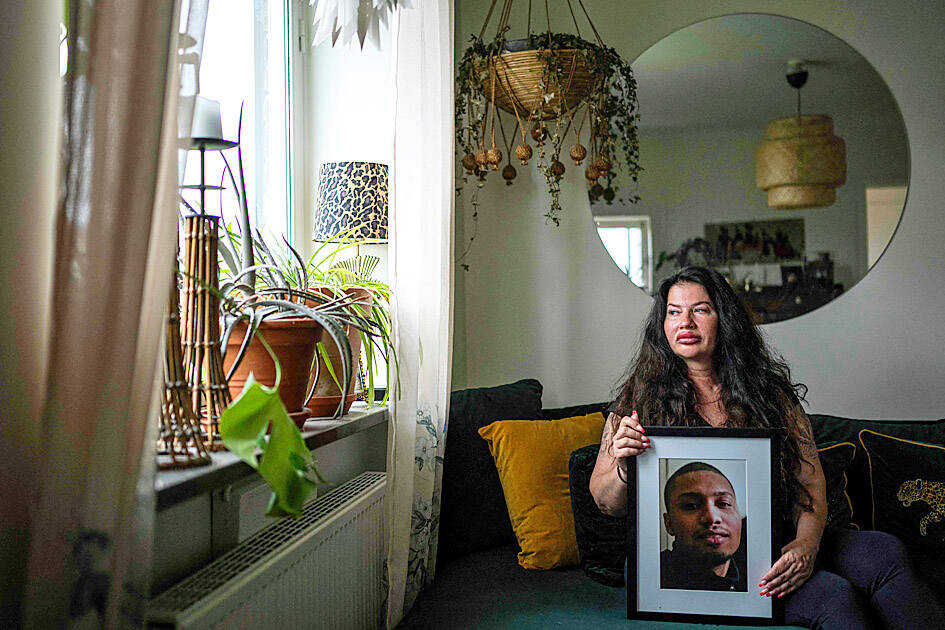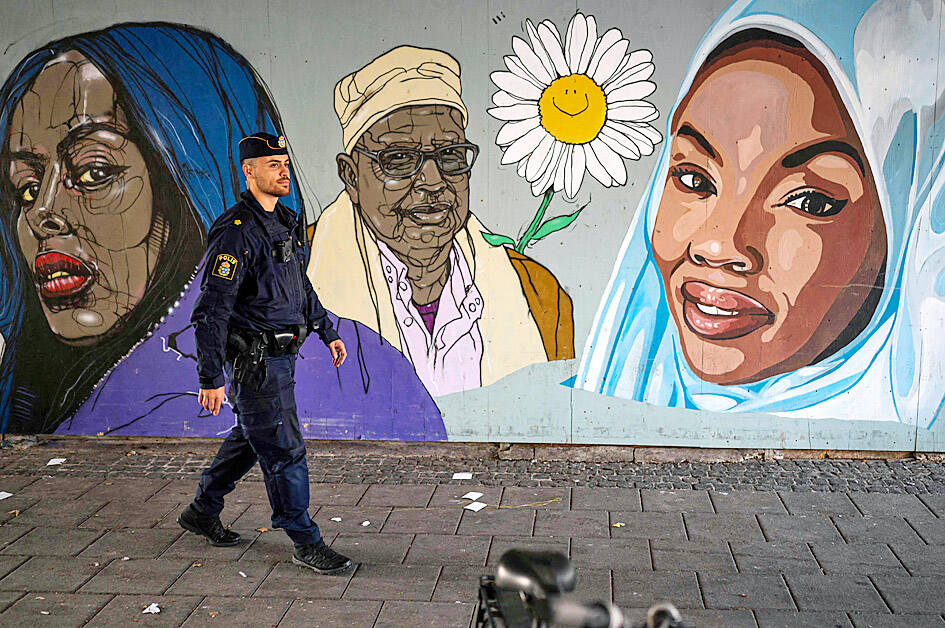Gang shootings have escalated and spread across Sweden in the past few years, with authorities struggling to contain the war-like violence that now tops voters’ concerns ahead of Sunday’s general election.
“This is my son, Marley, when he was 19 years old,” Maritha Ogilvie said, holding a framed photograph of a smiling young man, one of many that adorn the walls of her Stockholm apartment.
“He was shot in the head sitting in a car with a friend,” the 51-year-old said.

Photo: AFP
The killing, on March 24, 2015, in Varby gard, a disadvantaged concrete suburb southwest of Stockholm, has never been resolved and the case was closed 10 months later.
Murders like these are usually settlings of scores between rival gangs often controlled by immigrant clans and increasingly taking place in public places in broad daylight, police said.
The violence is primarily attributed to battles over the drug and weapons market and personal vendettas. It has escalated to the point where Sweden — one of the richest and most egalitarian countries in the world — now tops the European rankings for fatal shootings.

Photo: AFP
According to a report published last year by the Swedish National Council for Crime Prevention, among 22 countries with comparable data, only Croatia had more deadly shootings, and no other country posted a bigger increase than Sweden in the past decade.
Despite various measures introduced by the Social Democratic government to crack down on the gangs — including tougher prison sentences and boosting police resources — the number of dead and injured continues to mount.
Since Jan. 1, 48 people had been killed by firearms in Sweden — three more than the total for last year.
There are also frequent bombings of homes and vehicles, and grenade attacks.
For the first time, crime has dislodged the usual welfare state issues of healthcare and education, and is one of Swedes’ main concerns in Sunday’s election.
While the violence was once contained to locations frequented by criminals, it has now spread to public spaces, sparking concern among ordinary Swedes in a country long known as safe and peaceful.
On Aug. 19, a 31-year-old man identified as a gang leader in Sweden’s third-biggest city, Malmo, was gunned down in the Emporia shopping center, several months after the death of his brother.
A 15-year-old was arrested for the murder.
A week later, a young woman and her son were wounded by stray bullets as they played in a park in Eskilstuna, a quiet town of 67,000 people west of Stockholm.
The right-wing opposition, led by the conservative Moderates and the far-right Sweden Democrats who hope to wrest power from the Social Democrats, have vowed to restore “law and order.”
Defending the left from allegations of laxism, Swedish Prime Minister Magdalena Andersson has promised a “national offensive” against the scourge, which poses “a threat to all of Sweden.”
The escalating crime numbers are due to the emergence of “parallel societies” following “too much immigration and too little integration,” Andersson said.
Jacob Fraiman, a former gangster who now helps other criminals leave that life behind, said even he is shocked by the level of violence.
“I’m from another generation, obviously we had weapons, too, but it wasn’t often you had to shoot someone,” he said in Sodertalje, an industrial town south of Stockholm with a large immigrant population.
“You used to shoot someone in the legs. Now, they’re told to shoot in the head,” he said.
At the police station in Rinkeby, one of Stockholm’s disadvantaged suburbs, 26-year-old patrol cop Michael Cojocaru said he and his colleagues regularly encounter brutal violence reminiscent of war and seize assault weapons, grenades and explosives.
“You’ll see wounds, people who’ve been shot with AK47s, who’ve been stabbed, people who have war wounds,” he said. “It’s like a totally different society ... another type of Sweden.”
Experts attribute the escalating violence to a series of factors, including segregation, integration and economic difficulties for immigrants, and a large black market for weapons.
The recruitment of young teens into criminal gangs — who are not tried as adults if they get caught — is also a major concern.
Seven years later, Maritha Ogilvie is still trying to understand why her son was killed.
“I don’t know what happened with our society. I don’t know how they lost control over certain areas, but they did,” she said. “And it keeps on getting worse.”

Thousands gathered across New Zealand yesterday to celebrate the signing of the country’s founding document and some called for an end to government policies that critics say erode the rights promised to the indigenous Maori population. As the sun rose on the dawn service at Waitangi where the Treaty of Waitangi was first signed between the British Crown and Maori chiefs in 1840, some community leaders called on the government to honor promises made 185 years ago. The call was repeated at peaceful rallies that drew several hundred people later in the day. “This government is attacking tangata whenua [indigenous people] on all

RIGHTS FEARS: A protester said Beijing would use the embassy to catch and send Hong Kongers to China, while a lawmaker said Chinese agents had threatened Britons Hundreds of demonstrators on Saturday protested at a site earmarked for Beijing’s controversial new embassy in London over human rights and security concerns. The new embassy — if approved by the British government — would be the “biggest Chinese embassy in Europe,” one lawmaker said earlier. Protester Iona Boswell, a 40-year-old social worker, said there was “no need for a mega embassy here” and that she believed it would be used to facilitate the “harassment of dissidents.” China has for several years been trying to relocate its embassy, currently in the British capital’s upmarket Marylebone district, to the sprawling historic site in the

The administration of US President Donald Trump has appointed to serve as the top public diplomacy official a former speech writer for Trump with a history of doubts over US foreign policy toward Taiwan and inflammatory comments on women and minorities, at one point saying that "competent white men must be in charge." Darren Beattie has been named the acting undersecretary for public diplomacy and public affairs, a senior US Department of State official said, a role that determines the tone of the US' public messaging in the world. Beattie requires US Senate confirmation to serve on a permanent basis. "Thanks to

‘IMPOSSIBLE’: The authors of the study, which was published in an environment journal, said that the findings appeared grim, but that honesty is necessary for change Holding long-term global warming to 2°C — the fallback target of the Paris climate accord — is now “impossible,” according to a new analysis published by leading scientists. Led by renowned climatologist James Hansen, the paper appears in the journal Environment: Science and Policy for Sustainable Development and concludes that Earth’s climate is more sensitive to rising greenhouse gas emissions than previously thought. Compounding the crisis, Hansen and colleagues argued, is a recent decline in sunlight-blocking aerosol pollution from the shipping industry, which had been mitigating some of the warming. An ambitious climate change scenario outlined by the UN’s climate